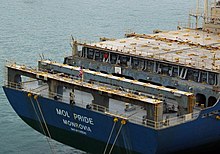
Back علم الملاءمة Arabic Rahat bayraqlar Azerbaijani Удобен флаг Bulgarian Pavelló de conveniència Catalan Bekvemmelighedsflag Danish Ausflaggung German Σημαία ευκαιρίας Greek Flago de oportuno Esperanto Pabellón de conveniencia Spanish Mugavuslipp Estonian


Flag of convenience (FOC) is a business practice whereby a ship's owners register a merchant ship in a ship register of a country other than that of the ship's owners, and the ship flies the civil ensign of that country, called the flag state.[1] The term is often used pejoratively, and although common, the practice is sometimes regarded as contentious.
Each merchant ship is required by international law to be registered in a registry created by a country,[2] and a ship is subject to the laws of that country, which are used also if the ship is involved in a case under admiralty law. A ship's owners may elect to register a ship in a foreign country so as to avoid the regulations of the owners' country, which may, for example, have stricter safety standards. They may also select a jurisdiction to reduce operating costs, avoiding higher taxes in the owners' country and bypassing laws that protect the wages and working conditions of mariners.[3] The term "flag of convenience" has been used since the 1950s. A registry which does not have a nationality or residency requirement for ship registration is often described as an open registry. Panama, for example, offers advantages such as easier registration (often online), the ability to employ cheaper foreign labour, and an exemption on income taxes.
The modern practice of ships being registered in a foreign country began in the 1920s in the United States when shipowners seeking to serve alcohol to passengers during Prohibition registered their ships in Panama. Owners soon began to perceive advantages in terms of avoiding increased regulations and rising labor costs and continued to register their ships in Panama even after Prohibition ended. The use of open registries steadily increased, and in 1968, Liberia grew to surpass the United Kingdom with the world's largest ship register.
As of 2021[update], more than half the world's merchant ships were registered with open registries, and almost 40% of the entire world fleet, in terms of deadweight tonnage, (DWT) were registered in Panama, Liberia, and the Marshall Islands.[4] It is estimated that nearly two thirds of the world's fleet is registered in states to which they have no connection.[5][6] According to the UN Conference on Trade and Development (UNCTAD), in January 2021, Panama had 6,653 ships on its registry (16 per cent of the global fleet by DWT), followed by Liberia (3,909), Marshall Islands (3,732), Singapore (2,541), and Hong Kong (2,440).[4]
- ^ Bernaert, 2006, p. 104.
- ^ ICFTU et al., 2002, p. 7.
- ^ Kemp, 1976.
- ^ a b "UNCTADstat". unctadstat.unctad.org. Retrieved 11 November 2022.
- ^ DeSombre, Elizabeth R. (2006). Flagging standards: globalization and environmental, safety, and labor regulations at sea. MIT Press Books 1.
- ^ Benson, Emily; Puga, Catherine (9 August 2021). "Flagging the Issues: Maritime Governance, Forced Labor, and Illegal Fishing". www.csis.org. Retrieved 11 November 2022.
© MMXXIII Rich X Search. We shall prevail. All rights reserved. Rich X Search